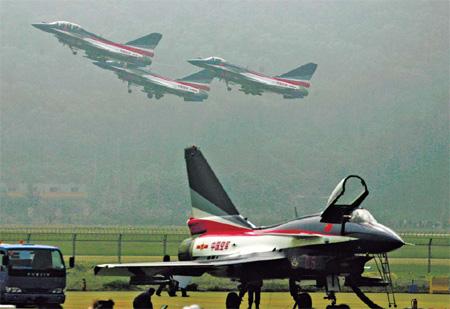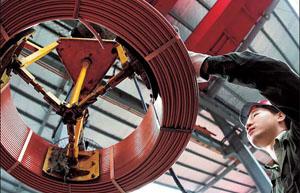
A Chinese-made J-10 fighter jet, with new markings, is prepared for flight as three J-10 fighter jets get airborne in formation during the China International Aviation and Aerospace Exhibition, which opened on Tuesday in Zhuhai, Guangdong province. [Photo/China Daily]
C919 scheduled to make maiden flight in 2014; delivery seen in 2016
ZHUHAI, Guangdong - China's challenger to Boeing and Airbus announced the first 100 orders for its single-aisle commercial aircraft from four Chinese airlines and two leasing companies, revving up global competition in the domestic aviation market, predicted to be worth more than $450 billion over the next two decades.
The breakthrough orders for the 160-seat C919 were placed at the Zhuhai air show by four of China's major carriers - Air China, China Eastern, China Southern, Hainan Airlines - and the airplane leasing company General Electric Capital Aviation Services of the United States as well as a Chinese leasing firm.
 New energies to lead copper growth
New energies to lead copper growthIt is the first time buyers have committed to the aircraft, which COMAC expects to start building next year, followed by a maiden flight in 2014 and first delivery in 2016.
"The customer signing lays a market foundation for the C919, which has smoothly entered the engineering development phase," Zhang Qingwei, COMAC chairman, said in a statement.
A similar deal for Airbus or Boeing jets would be worth about $7 billion at list prices, but aircraft are normally sold at a discount of at least 20 percent and analysts said China would have to work hard to woo foreign airlines.
The plane's designer Wu Guanghui said on Monday that the company is expecting more than 2,000 orders from domestic and international buyers.
The plane is a prospective competitor to Boeing 737 and the Airbus A320, particularly in the domestic market where the two global aircraft manufacturing giants currently dominate.
"In the US, Boeing takes the lead. In France, it is the Airbus. I hope one day the C919 can dominate our home market," said Liao Quanwang, executive vice-president of the development research center at the Aviation Industry Corp of China (AVIC). He was speaking during an air show media conference at which he gave AVIC'S outlook on the industry over the coming decades.
The orders for the C919 are seen as a vote of confidence in China's decades-long quest to develop large passenger jets.
"If the product is good it will sell. The airlines will not take delivery and operate this aircraft unless it's competitive," Laurence Barron, Airbus China president, said at the news conference.
Boeing said it welcomes competition as a catalyst for innovation.
"The C919 is a good thing and there is room for competition," said James Simon, vice-president of Boeing China commercial-airplane sales. "It makes all of us do our job better and build more efficient aircraft."
China's fast growing economy has created a booming market for plane makers and both AVIC and COMAC forecast growing demand for aircraft.
By the end of September, turnover in the aviation sector had increased by 28.9 percent nationwide, with passenger transportation up by 17.8 percent and cargo transportation up by 29.9 percent year-on-year, according to the outlook released by AVIC.
Increased spending power among the population will generate a major aviation market, second only to the US, it forecast.
The country needs 4,265 new aircraft in the coming two decades - 3,371 large and medium jets and 894 regional aircraft, according to AVIC, with passenger turnover expected to grow annually by 8.3 percent and cargo transportation by 9.8 percent.
COMAC also issued its forecast for the next two decades and predicted a market with 4,439 civil aircraft with a value estimated at more than $450 billion.
COMAC predicted the country's large aircraft fleet will jump to 3,750 in the same period.
Single-aisle jets and regional aircraft will be the major models flying the domestic routes, said Dang Tiehong, director of market research at COMAC.
Brazilian aircraft manufacturer Embraer forecast a demand of about 950 new regional jets over the next 20 years in China.
Wang Huazhong and Reuters contributed to this story.



